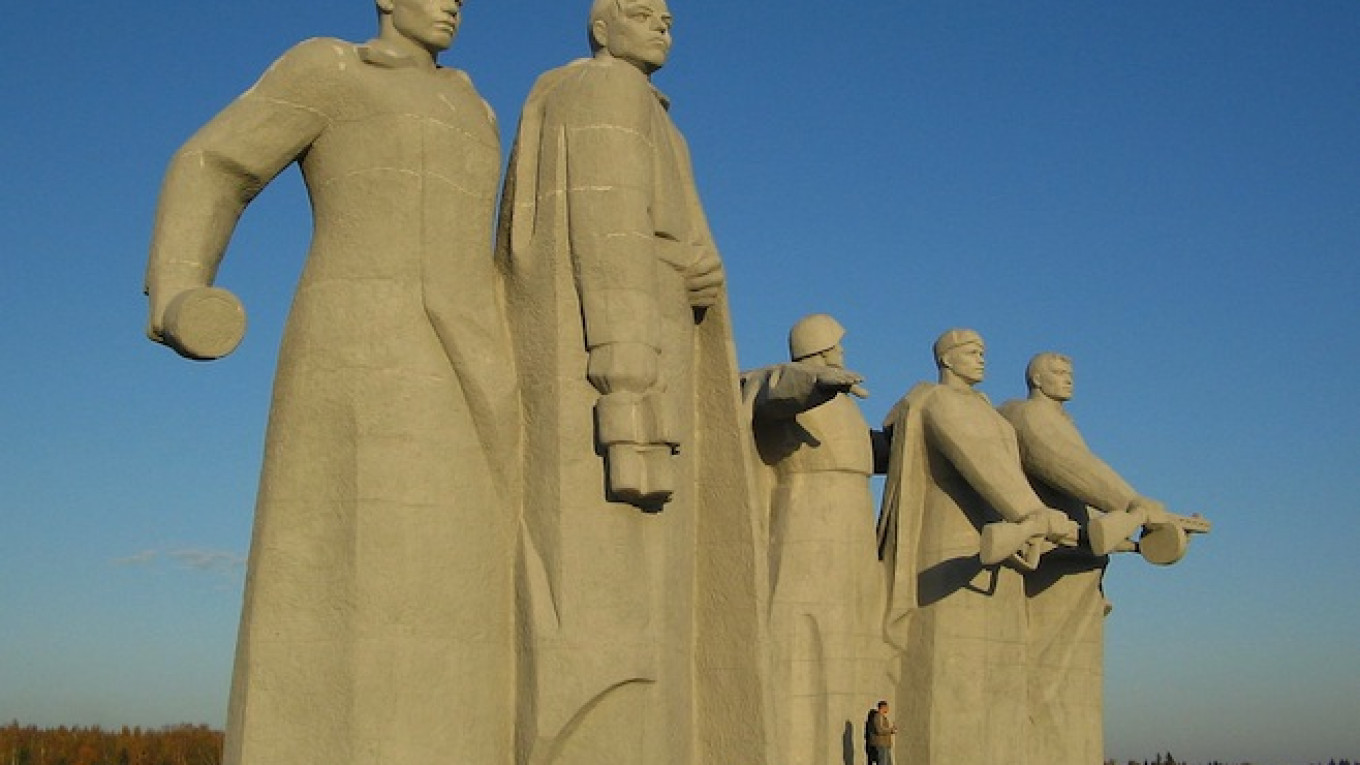Russia's state archive service has published a secret memo by Stalin-era prosecutors arguing that legends of heroism attributed to a group of soldiers credited with having heroically halted Nazi tanks headed for Moscow before perishing together on the battlefield were in fact a product of shoddy news reporting.
The 1948 memo, signed by Soviet Chief Military Prosecutor Nikolai Afanasyev and marked “top secret,” corroborates a view long held by some of Russia's liberally minded historians and pundits, arguing that the “Panfilovtsy,” (Panfilov's men) were nowhere near as heroic as they had been cast in Russian history books.
But its publication on the state archive service's website Wednesday seems to fly in the face of Moscow's recent fervor to dispel any doubts of the Red Army's heroism, and comes shortly after the Russian culture minister praised a soon-to-be-released film glorifying the “Panfilovtsy.”
The “28 Panfilovtsy,” who fought under Major General Ivan Panfilov, have long been a household name in the country, with scores of films and books having credited them with stopping German tanks during the Battle of Moscow, and praised them as Red Army legends.
According to a long-held official version of the events, the men all died during the battle, and were posthumously decorated as Heroes of the Soviet Union.
But instead, according to the Soviet prosecutor's secret report, at least several of the men survived — including one who was arrested in 1947 on charges of high treason and confessed to having “voluntarily” surrendered to German troops and later joined a German police force.
The more glamorous version of their fight to save Moscow appears to have been invented by reporters for the official military newspaper Krasnaya Zvezda, who first wrote about the story in late 1941, and then added more heroic details in subsequent dispatches, the prosecutor's memo said.
It was the glamorous version that has taken root and has persisted even after some historians denounced it as inaccurate when the findings of dictator Josef Stalin’s investigators were declassified after the Soviet collapse.
At least one of the men still listed among “Panfilov's 28” — Ivan Dobrobabin, also known as Dobrobaba — survived the war and returned to his hometown in Kyrgyzstan to find a monument commemorating him as a dead hero, according to accounts published in Russian press after the collapse of the Soviet Union. When he tried to reclaim his identity as a living member of “Panfilov's 28,” he was reportedly arrested for treason and sent to the gulags, while the legend of his heroic death lived on in Soviet films and textbooks.
A similar fate reportedly befell another of the original “Panfilov's 28,” Daniil Kozhubergenov, whose name is said to have been removed from the list and replaced with that of another man when he turned out to be alive and tried to demand the military benefits due to a decorated soldier, according to an account by independent newspaper Novaya Gazeta.
Now a Russian studio is working on a film entitled “The 28 Panfilovtsy,” which is meant to heap praise on the soldiers. The project is being crowd-funded by Russian netizens, who have raised more than 33 million rubles ($575,000) so far, according to its website.
The film's producer Andrei Shalyopa has denounced the state archives' publication of the memo as undermining the “moral potential” of the nation, the Titr news portal reported.
“This is something that is part of our national self-awareness. These are simple examples that help us raise new generations,” he was quoted as saying. “Trying to debunk instances of national heroism can only be done to weaken the people's moral foundation. One can hardly think of a noble motive for that.”
Culture Minister Vladimir Medinsky earlier this summer praised the planned release of the film, scheduled for this fall, telling the upper chamber of Russia's parliament that the production reflected the country's interest in patriotic films, TASS reported.
He had also praised the planned film during the project's initial stages in late 2013, calling it “very symbolic” and saying it reflected a “healthy society, [where] people are ready to spend their time and money on some of the right things.”
Contact the author at newsreporter@imedia.ru
A Message from The Moscow Times:
Dear readers,
We are facing unprecedented challenges. Russia's Prosecutor General's Office has designated The Moscow Times as an "undesirable" organization, criminalizing our work and putting our staff at risk of prosecution. This follows our earlier unjust labeling as a "foreign agent."
These actions are direct attempts to silence independent journalism in Russia. The authorities claim our work "discredits the decisions of the Russian leadership." We see things differently: we strive to provide accurate, unbiased reporting on Russia.
We, the journalists of The Moscow Times, refuse to be silenced. But to continue our work, we need your help.
Your support, no matter how small, makes a world of difference. If you can, please support us monthly starting from just $2. It's quick to set up, and every contribution makes a significant impact.
By supporting The Moscow Times, you're defending open, independent journalism in the face of repression. Thank you for standing with us.
Remind me later.


